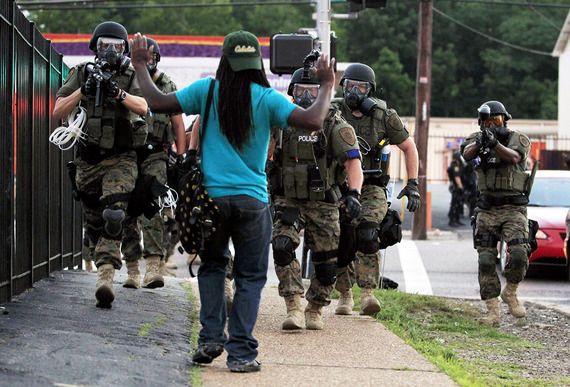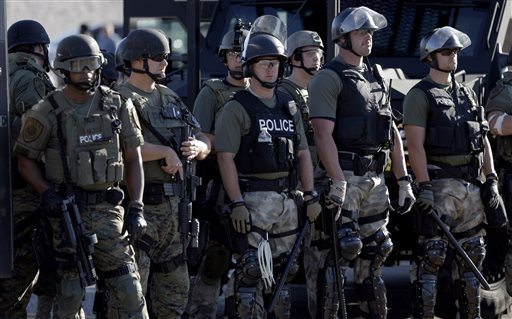 Source: The New York Post
Source: The New York Post
There's an old question: If a tree falls in a forest and nobody is around to hear it, does it make a sound? Today's Constitutional analog: Do rights exist if you can't enforce them?
Civil rights advocacy organizations have long conducted "know your rights" trainings especially directed at teenagers, students, communities of color, undocumented immigrants and other vulnerable populations. Since news of the death of Sandra Bland, the media has once again featured lawyers and professors explaining what legal rights people have when stopped by the police. Listicles of what to do if you're stopped by the police are being widely circulated. Tellingly, the practical lists advising what to do often diverge from what the law says you have the right to do, especially when these lists are written for or by those in marginalized and targeted communities.
Sandra Bland knew her rights. She asserted her rights. In return for being a black woman asserting her rights, she was assaulted, arrested, thrown in jail, and ended up dead. If the Constitution guarantees you a right that someone with more power is able to keep you from exercising, do you actually have that right?
Every day, people without privilege or power who try to claim treatment consistent with the most basic of human rights are harassed, beaten up, maced, tased, arrested, locked up, and killed for the impudence of daring to assert those rights. In reality, rights are effectively meaningless without access to the physical, political, and financial capital to enforce and protect those rights. The Bill of Rights carry a caveat: if you're poor, not white, don't speak English, or if you look like you might be one or more of those, forget it. And if you only look like one of those, maybe you'll be lucky enough -- some day years in the future -- to be able to access the legal system to recover some kind of damages for the harms done you.
But even that access doesn't keep the harms from being done in the first place, and isn't that the point of rights? Not just to remedy wrongs post-hoc, but to prevent violations in the first instance? Aren't the rights enshrined in the Constitution supposed to function as vaccines to keep people from being beaten up, harassed, or shot, rather than only salves to be administered to dilute the effects of such actions after the fact? The viruses of State-sanctioned-isms leave scars that can't be erased, no matter how potent the balm.
The full meaning of access to justice is access to the justice of not having rights unlawfully violated in the first place. The full promise of the Constitution is the presumption that rights must be respected, and we should set our sights on nothing short of this. Those whom we imbue with State power must be presumed not to have the automatic right to wield that power against people. They are the ones whose behavior we must carefully police, and they should be the first subjects of scrutiny when an incident is reported.
Every article I've read, whatever the angle, refers to the police stop of Sandra Bland as a "routine" traffic stop, presumably intended to mean that there was nothing about what Sandra Bland had done that should have aroused particular suspicion of anything other than a minor traffic violation. But there is nothing "routine" about these traffic stops except that they have been allowed to become routine; the very grant of this adjective desensitizes us to the ways in which pretextual stops are used to differentially oppress entire communities. The fact that something happens frequently should not make it "routine" in the sense of the law. Yet this is exactly the legal standard that has devolved from the shiny promise of the Constitution.
The test set forth by the Supreme Court for most alleged violations by police, jail and prison officials asks: what would a "reasonable" officer in the same circumstances with the same information do? Though the Court hides behind the pretense of calling this an "objective" test, it is in fact a relative test: use of the "reasonableness" standard implies something graded on a curve. The benchmark moves with the popularity of a course of action. And so, for years, it has been deemed reasonable -- at least tacitly by virtue of the lack of prosecution -- to mace and tase and beat and shoot Black people during traffic stops. Routine. An officer's "fear for his life" has been impliedly approved as a reasonable reaction if the person being stopped is Black, especially if that person does not genuflect in absolute submission.
Similarly, even if a court determines an officer did actually violate someone's rights, the current legal standard allows that officer to be excused from accountability if it was not already "clearly established" that the officer's actions were outside the bounds of the law. This creates a presumption that is effectively the nemesis of the individual rights promised by the Constitution: the presumption of law enforcement action as legitimate unless previously and indisputably stated otherwise. Shouldn't it be the opposite? Shouldn't law enforcement action outside the bounds of what has previously been affirmatively approved as Constitutional be presumed to be impermissible? Shouldn't power allocated by the government to officers -- who are, after all, humans, and susceptible to the same biases and misjudgments as the rest of us -- be presumed to be circumscribed? Just as the Tenth Amendment reserves powers not specifically delegated to the federal government to the states, shouldn't power not specifically allocated to law enforcement be presumed unauthorized?
 Source: KXAN
Source: KXAN
Certainly, the jobs of law enforcement officers are dangerous, and those who dedicate their lives to such service should be commended. But recognition of this truth does not nullify the argument that their power should also be carefully boundaried, especially where there is significant room for interpretation of what "reasonable" might be, depending on the point of view. Measuring reasonable by the standard of the "objective" officer really translates into the standard of the presumptive default officer -- and, as lawsuits have established time and again, law enforcement agencies heavily skew white and male and straight. So, too, does what is viewed as "reasonable."
The impotence of "having" rights simply by virtue of their presence in the Constitution is depressingly well-illustrated by the case of one of my clients -- a young black man diagnosed as acutely schizophrenic, paranoid type, who was in a California prison in 2012 serving a one-year term on a parole violation. His mental health severely decompensated while he was housed in a segregation unit and he was transferred to a so-called "mental health crisis bed" unit. Although he was judged "gravely disabled" at that time, he was left untreated by the psychiatrist who, by his own admission, was waiting for my client's mental health to decompensate to the point where it would be easier to get a court to issue an involuntary medication order. As a result, the treatment team did not refer my client to a psychiatric hospital for the level of care that he needed. Instead, they left him to deteriorate locked naked in a cell with only his hallucinations until he was in such crisis that he was smearing feces on himself. Then the prison guards, geared up in Storm Trooper-like regalia, pumped canisters of pepper spray into his cell, opened the door, and swarmed him, taking him violently to the floor -- the whole time, ignoring his tortured cries for help and his repeated entreaties that he did not understand what they were asking him to do. Next, the doctor ordered my client into five-point restraints, meaning he was shackled to a bed by his waist, wrist, and ankles, still soaked in the pepper spray, for almost 72 continuous hours.
A federal court already considered this incident as part of the evidence in a class action case challenging California's treatment of people with psychiatric illness in prison. As a result of this and other evidence, the court found in early 2014 that the State's use of force against people with psychiatric illness in its prisons violated their Constitutional right to be free from cruel and unusual punishment. Yet I have been fighting on my client's behalf since then -- and with trial set still almost another year off -- for the State to take responsibility for its actions and pay my client damages so that he can have the possibility of recovery from this horrific abuse. Instead of doing so, the State continues to pour taxpayer money into its defense of the indefensible.
Even though a federal court has already recognized that the State's torture of my client was part of a pattern of systemic violation of Constitutional rights, three years after these heinous acts, he is still fighting for recognition of his right to be free from such cruel and unusual punishment. In the meantime, still on parole and without access to needed resources, he is without permanent housing, without reliable treatment, and cycling in and out of mental health crisis. Were he put back in prison, there is nothing that makes me believe this couldn't happen again. What rights would he have then?
